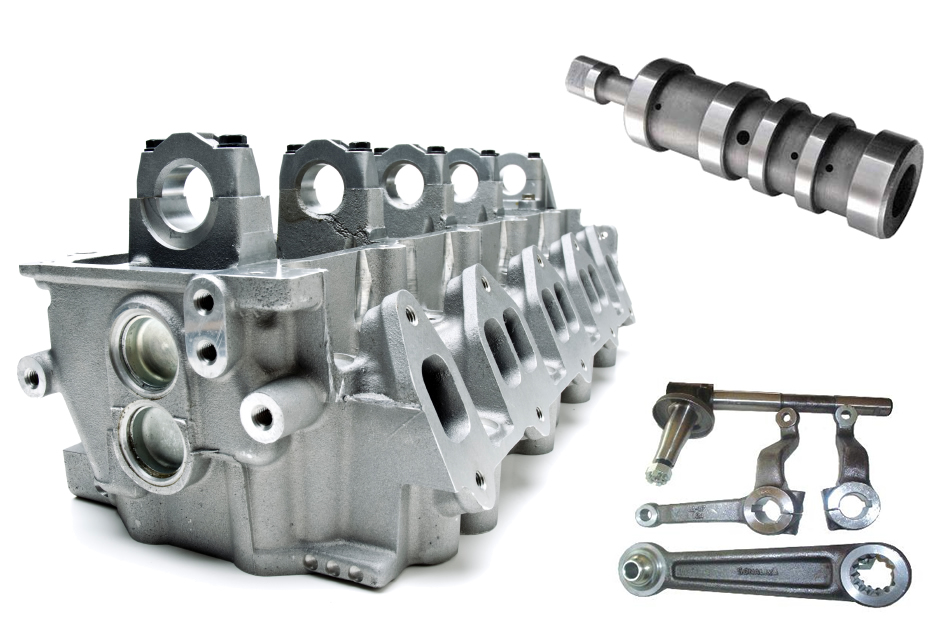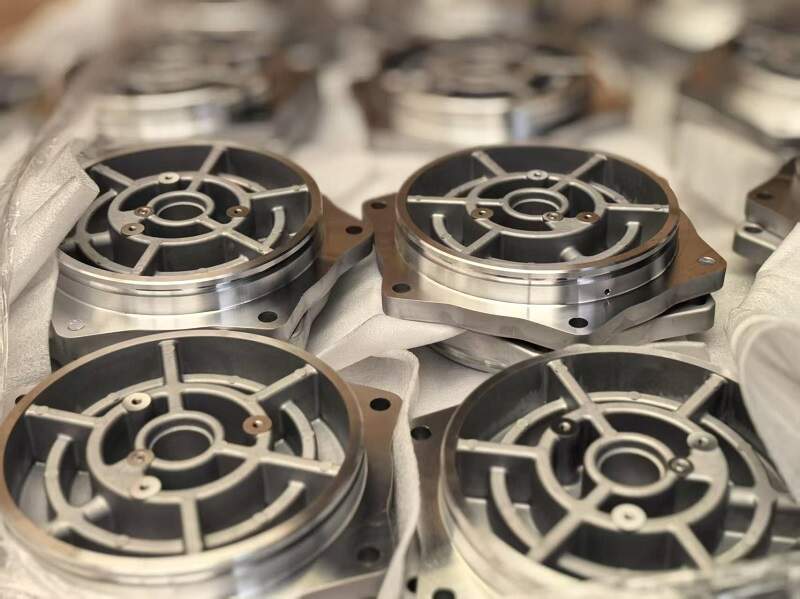Why Precision aluminum casting is perfect for lightweight metal solutions
Wiki Article
Exploring the Cutting-edge Processes Behind Modern Aluminum Foundry Procedures
Modern aluminum shop operations are undergoing substantial makeover. Automation and AI are improving manufacturing techniques, boosting both performance and accuracy. The integration of 3D printing is improving mold and mildew development, while sustainability techniques are coming to be extra necessary. Each of these improvements plays a vital role in redefining the market. The implications of these modifications expand past mere production performance. What opportunities and difficulties exist ahead for aluminum factories in this developing landscape?The Role of Automation in Light Weight Aluminum Foundries

Automation contributes to improved security requirements within the shop setting. By transferring dangerous tasks to machines, human employees can concentrate on supervisory roles and quality control, decreasing the threat of crashes. On top of that, data analytics derived from automated processes supply useful insights right into functional performance, leading to much better decision-making and constant improvement. As the demand for light weight aluminum items grows, the fostering of automation modern technologies will likely expand, further changing the landscape of aluminum foundry operations.
Advancements in Spreading Technologies
Recent advancements in casting modern technologies are changing aluminum foundry procedures. Developments such as 3D printing integration, progressed alloy solutions, and automated procedure optimization are improving efficiency and item quality. These growths are essential in meeting the developing demands of the sector.3D Printing Integration
Integrating 3D printing innovation right into aluminum foundry procedures has actually revolutionized conventional casting techniques, improving both efficiency and precision. This innovative technique enables the quick production of complex mold and mildews and cores, significantly minimizing lead times and material waste. By making use of additive production, foundries can produce intricate geometries that were previously challenging or impossible to achieve with conventional techniques. The adaptability of 3D printing likewise enables fast design alterations, cultivating a much more agile production procedure. On top of that, this integration supports the use of light-weight frameworks, which is significantly crucial in sectors such as vehicle and aerospace. As aluminum foundries continue to take on 3D printing, they position themselves at the center of technological development, driving renovations in product quality and operational abilities.Advanced Alloy Formulations
The development of advanced alloy formulas has actually significantly enhanced casting innovations in aluminum shop procedures. These formulations incorporate different aspects, such as magnesium, silicon, and copper, to boost mechanical residential properties and thermal resistance. By tailoring the make-up of light weight aluminum alloys, manufacturers can attain certain efficiency features that meet the demands of diverse applications, from auto elements to aerospace frameworks. Using sophisticated alloys likewise adds to reduced weight and enhanced stamina, which are vital consider modern engineering. In addition, innovations in alloy advancement allow better fluidness during casting, causing enhanced surface area coatings and decreased defects. Overall, advanced alloy solutions stand for a considerable jump onward, placing light weight aluminum shops to meet the progressing needs of different sectors efficiently.Automated Process Optimization
Innovations in casting technologies have actually led the way for automatic process enhancement in aluminum foundry operations. By integrating advanced software program and real-time data analytics, factories can currently simplify manufacturing processes and improve quality assurance. Automated systems monitor variables such as air conditioning, temperature, and pressure prices, permitting immediate adjustments that lessen problems and waste. In addition, artificial intelligence formulas evaluate historical performance information to anticipate excellent settings, therefore raising performance and minimizing cycle times. Robotics likewise play a considerable duty, taking care of repeated jobs that improve safety and accuracy. On the whole, these technologies not just drive operational effectiveness but likewise enable factories to fulfill the growing need for high-quality aluminum parts in different markets.Smart Manufacturing and Market 4.0 Integration
The assimilation of Smart Manufacturing and Industry 4.0 within light weight aluminum foundries is transforming operational efficiency. By leveraging IoT modern technologies, automation, and robotics, factories can enhance manufacturing procedures and decrease downtime. In addition, information analytics supplies essential understandings that enhance decision-making and drive continual renovation.IoT in Shop Operations
As manufacturers progressively embrace the Net of Points (IoT), factory operations are experiencing a transformative change towards wise manufacturing and Sector 4.0 assimilation. Aluminum Foundry. IoT innovations enable real-time data collection and analysis, improving decision-making processes and operational effectiveness. Sensors and connected gadgets check tools efficiency, material usage, and ecological problems, permitting proactive upkeep and source optimization. This connection fosters a more active production setting, where changes can be made swiftly in action to market needs. In addition, IoT facilitates enhanced traceability and quality assurance, as information from the entire manufacturing cycle can be easily accessed and examined. Overall, the combination of IoT in foundry operations significantly improves efficiency and drives development in aluminum production processesAutomation and Robotics Integration
Automation and robotics assimilation is changing aluminum shop operations by improving efficiency and accuracy. This transformative technique enhances procedures such as molding, putting, and ending up, lowering human mistake and raising result uniformity. By utilizing sophisticated robot systems, foundries can accomplish greater manufacturing rates while keeping rigid quality requirements. Automated systems additionally enable real-time surveillance and flexible control, enabling swift modifications to production criteria. In addition, the combination of robotics lessens labor prices and alleviates safety dangers linked with hands-on handling of liquified steel. As foundries welcome smart production principles fundamental in Sector 4.0, the synergy between automation and robotics strengthens their one-upmanship, leading the way for lasting growth and innovation in the aluminum casting market.Data Analytics for Efficiency
Using information analytics considerably enhances effectiveness within light weight aluminum factory operations, aligning Homepage with clever manufacturing and Market 4.0 principles. By leveraging real-time information collection and evaluation, shops can monitor manufacturing processes, forecast equipment failings, and enhance source allocation. This data-driven approach helps with informative decision-making, making it possible for managers to recognize traffic jams and boost operations. Furthermore, predictive analytics encourages shops to prepare for market needs, consequently lowering waste and guaranteeing timely item delivery. Assimilation of information analytics with IoT tools improves operational exposure, cultivating a proactive upkeep culture. Inevitably, implementing these sophisticated analytical techniques not only boosts efficiency yet likewise drives innovation, positioning aluminum foundries to meet the progressing demands of the industry while maintaining one-upmanships in a rapidly changing landscape.Lasting Practices in Light Weight Aluminum Spreading
While the aluminum spreading sector has commonly dealt with environmental challenges, several foundries are currently embracing sustainable practices to minimize their influence (aluminum casting). A considerable focus has actually been on reusing aluminum scrap, which not just reduces waste but additionally conserves power contrasted to main see page light weight aluminum manufacturing. Cutting-edge melting technologies, such as induction furnaces, boost energy efficiency and lower greenhouse gas emissionsAdditionally, foundries are carrying out closed-loop water supply to minimize water usage and lower thermal air pollution. The usage of green binders in mold-making processes is getting grip, more lowering hazardous discharges.
Some centers are spending in renewable energy sources to power procedures, aligning with international sustainability objectives. By integrating these techniques, the light weight aluminum casting sector is developing toward an extra eco liable future, showing that financial growth can exist together with ecological stewardship - Aluminum Foundry. These efforts reflect a commitment to sustainability and the importance of environmental responsibility in production
High Quality Control Innovations
As the light weight aluminum casting sector breakthroughs in the direction of sustainability, the value of top quality control advancements comes to be progressively apparent. Modern light weight aluminum factories are taking on sophisticated modern technologies to enhance their quality control processes. Techniques such as real-time surveillance and information analytics enable suppliers to spot variances and flaws early in the production cycle. Carrying out automated assessment systems furnished with equipment learning algorithms guarantees that items satisfy rigid top quality criteria while reducing human mistake.The assimilation of non-destructive screening techniques, such as ultrasonic and radiographic assessments, supplies much deeper understandings into the honesty of castings without damaging the product. These technologies not only boost product dependability yet also lower waste, lining up with sustainability goals. Furthermore, the adoption of standardized top quality frameworks assists simplify operations throughout various foundries, ensuring uniformity in output. Collectively, these advancements are improving quality assurance, cultivating a society of quality within the aluminum casting market.
Future Patterns in Light Weight Aluminum Foundry Workflow
What advancements lie ahead for aluminum shop procedures? The future of aluminum shops is positioned for makeover via improvements in automation, expert system, and sustainable practices. The combination of robotics and automated systems is anticipated to enhance performance and accuracy in the casting procedures, reducing human mistake and labor costs. In addition, AI-driven analytics will enable real-time surveillance and predictive maintenance, enhancing operational efficiency and decreasing downtime.Sustainability stays a centerpiece, with foundries progressively taking on environment-friendly techniques, such as making use of recycled aluminum and developing low-emission melting modern technologies. Advancements in 3D printing are additionally prepared for to revolutionize mold-making, enabling complicated geometries and minimized material waste. As the industry accepts digitalization, data-driven decision-making will become critical, allowing shops to respond promptly to market demands. Jointly, these trends promise to redefine aluminum factory operations, making them much more reliable, sustainable, and versatile to future difficulties.

Regularly Asked Questions
What Security Steps Are Implemented in Light Weight Aluminum Factory Operations?
Aluminum foundry procedures apply various security steps, including personal safety tools, air flow systems to take resource care of fumes, routine safety and security training, emergency action strategies, and rigorous monitoring of temperature and devices to stop accidents and warranty employee safety.How Do Shops Handle Workforce Training for New Technologies?

What Materials Are Typically Reused in Light Weight Aluminum Foundries?
Light weight aluminum foundries generally recycle scrap aluminum, including post-consumer products like drink containers, automobile components, and building and construction products. This reusing procedure reduces waste and preserves resources, adding to an extra sustainable light weight aluminum production sector.Just How Does Light Weight Aluminum Casting Impact the Atmosphere?
Light weight aluminum casting effects the environment through energy-intensive procedures, greenhouse gas emissions, and potential neighborhood pollution. Advancements in recycling and sustainable techniques can reduce these results, promoting a more environment-friendly approach to light weight aluminum manufacturing.What Are the Regular Lead Times for Light Weight Aluminum Spreading Projects?
Common preparation for light weight aluminum spreading projects vary substantially, generally varying from 2 to 6 weeks. Aspects influencing these timelines consist of complexity, order size, and material availability, affecting total manufacturing schedules in shop operations.
Automation significantly plays an important role in light weight aluminum shops, improving efficiency and accuracy in the manufacturing procedure. Improvements in casting innovations have paved the means for automated procedure improvement in aluminum foundry procedures. Harnessing data analytics significantly boosts performance within aluminum shop operations, aligning with clever manufacturing and Industry 4.0 principles. A considerable emphasis has been on recycling light weight aluminum scrap, which not only lowers waste however also saves energy compared to key light weight aluminum manufacturing. Light weight aluminum factories generally reuse scrap aluminum, consisting of post-consumer items like beverage canisters, automobile components, and building materials.
Report this wiki page